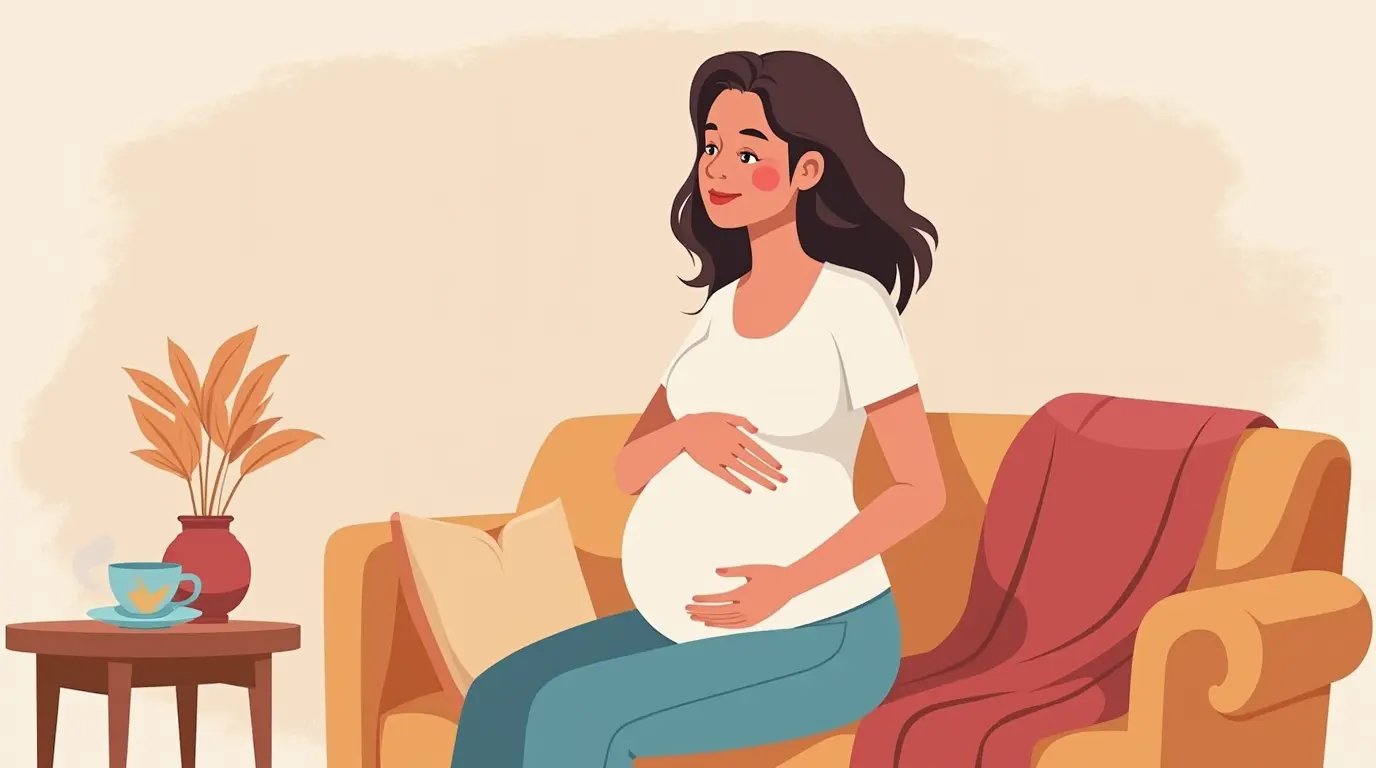Being pregnant can be both joyful and uncomfortable. Many women experience rib pain, a nagging or sharp feeling. This can make everyday tasks hard. But remember, you’re not alone in this.
Rib pain is common, affecting up to 40% of pregnant women. It’s a sign of the amazing changes your body is going through. The growing uterus and changing hormones play a role in this discomfort.
There’s good news: you can find relief. We’ll look at symptoms, causes, and ways to manage rib pain. This guide aims to make your pregnancy journey easier.
Table of Contents
Understanding Rib Pain During Pregnancy
Rib pain is common for many pregnant women. It feels like your ribs are out of place, hurting when you sit or bend. The pain can be sharp or dull, often worsening when you cough or laugh.
When Rib Pain Typically Occurs
Rib pain typically starts around 23 weeks of pregnancy. It gets worse in the third trimester as your body changes. The growing uterus can push on your ribs, making them flare and hurt.
Normal vs. Concerning Symptoms

Some rib pain is normal during pregnancy. But, if it’s constant or very bad, it might mean something’s wrong. See a doctor if you have trouble breathing or a fever.
| Normal Pregnancy Rib Pain Symptoms | Concerning Rib Pain Symptoms |
|---|---|
|
|
Knowing about rib pain symptoms, when rib pain typically occurs, and the difference between normal and concerning symptoms helps. This way, you can handle this common pregnancy issue better.
Primary Causes of Pregnancy-Related Rib Discomfort

During pregnancy, the body undergoes many changes. These changes can sometimes cause rib pain. Knowing what causes this pain can help pregnant women find relief.
The growing uterus is a main cause of rib pain. As the uterus expands, it presses against the ribs, causing discomfort. The baby’s movements also add to this pain, as they can directly press on the ribs.
Hormonal changes also play a big role. The hormone relaxin prepares the body for childbirth by loosening muscles and ligaments. Progesterone levels increase, affecting muscles and ligaments, including those around the ribs.
Other factors like bigger breasts, urinary tract infections, and medical conditions like gallstones or preeclampsia can also cause rib pain. It’s key to watch for any persistent or severe pain and talk to a healthcare provider.
| Cause | Explanation |
|---|---|
| Expanding Uterus | As the uterus grows, it pushes other organs, including the ribs, upward, resulting in a feeling of pressure or discomfort in the rib area. |
| Baby’s Movement and Position | The growing fetus can put direct pressure on the ribs, leading to discomfort. |
| Hormonal Changes | The production of relaxin and increased levels of progesterone can affect the muscles and ligaments surrounding the ribs, contributing to rib discomfort. |
| Increasing Breast Size | The growing size of the breasts can contribute to rib pain during pregnancy. |
| Underlying Medical Conditions | Conditions like gallstones or preeclampsia can also cause rib pain during pregnancy. |
Understanding the causes of rib pain in pregnancy helps expectant mothers manage it better. They can work with their healthcare providers to find relief and have a more comfortable pregnancy.
How Hormonal Changes Affect Your Ribs
During pregnancy, your body goes through big changes. Hormones play a big role in how your ribs feel. Knowing about these hormones helps you deal with rib pain.
The Role of Relaxin
Relaxin is a hormone that affects your ribs. It’s made more during pregnancy. It makes your joints and ligaments loosen and get more flexible.
This lets your ribs move more. But it can also cause inflammation and pain.
Impact of Progesterone
Progesterone also affects your ribs. It changes the muscles and ligaments, mainly in the pelvic area and spine. These changes can make your ribs uncomfortable.
Physical Adaptations
Your body changes to fit the growing baby. Your posture might change, and your rib cage might get more flexible. These changes can cause pain or pressure in your ribs.
“The changes in your body during pregnancy can be both exciting and challenging.Understanding how hormones like relaxin and progesterone affect your ribs can help you better manage any discomfort you experience.”
Managing Rib Pain During Pregnancy

Rib pain during pregnancy can be uncomfortable. Wearing loose clothes can help avoid extra pressure on your ribs. Keeping good posture also helps by giving your baby more room and easing rib strain.
Using pillows for support, like when you sleep, can greatly help. Taking short breaks to stretch can ease muscle tension. Massages, from a pro or your partner, can also soothe the pain.
Warm baths and support aids like rib braces and body pillows can help relieve rib pain during pregnancy. It’s key to balance rest and gentle exercise for pregnancy comfort tips. Activities like walking can keep you moving and reduce pain.
“The key to managing rib pain during pregnancy is finding a combination of strategies that work best for you. Don’t hesitate to try different approaches to find the relief you need.”
Every pregnancy is different, and what works for one might not for another. Listen to your body and talk to your healthcare provider if the pain doesn’t go away. With the right methods, you can manage rib pain and have a comfortable, healthy pregnancy.
Safe Exercise and Stretching Techniques

Being active during pregnancy is key, but picking the right exercises is vital. Choose gentle, safe movements to ease rib pain and keep you feeling good.
Beneficial Stretches
- Seated side stretches: Sit up straight and slowly stretch to one side, feeling a gentle pull. Repeat on the other side.
- Gentle upper back and chest stretches: Hold your hands behind your back and lift your arms, opening your chest and shoulders.
Recommended Physical Activities
- Swimming: This low-impact exercise eases rib pressure and works your whole body.
- Prenatal yoga: Picked yoga poses can improve your posture and flexibility, easing rib pain.
- Light walking: A daily walk boosts circulation and can lessen rib discomfort.
Posture Improvement Exercises
Maintaining good posture is essential for alleviating rib pain during pregnancy. Focus on exercises that help you stand tall, with relaxed shoulders and a slight back arch.
| Exercise | Description |
|---|---|
| Wall angels | Stand with your back against a wall, feet shoulder-width apart. Keep your arms and shoulders relaxed, then slide your arms up and down the wall. |
| Shoulder rolls | Gently roll your shoulders forward and backward, keeping your back straight and avoiding hunching. |
Always consult your healthcare provider before beginning any new exercises during pregnancy. Pay attention to your body, and stop immediately if you experience pain or discomfort.
Sleep Positions and Comfort Strategies
Rib pain during pregnancy can disrupt your ability to get a good night’s sleep. But, there are ways to ease this discomfort and get the rest you need.
Sleeping on your left side is often suggested. It can help ease pressure on your ribs and improve blood flow. Using pregnancy pillows, like U-shaped or C-shaped ones, can support your belly, back, and legs. This reduces strain on your ribcage.
Placing a pillow between your knees and another under your arm can also help. It improves your posture and reduces rib strain.
Some women find relief by sleeping in a semi-reclined position. This position, with multiple pillows supporting your upper body, can take the pressure off your ribs. It helps you rest more comfortably.
- Sleeping on your left side can ease pressure on your ribs
- Pregnancy pillows, like U-shaped or C-shaped ones, offer support and help reduce strain.
- Placing pillows between your knees and under your arm can improve posture and reduce rib pain
- Sleeping in a semi-reclined position with multiple pillows can also help provide relief from rib pain during pregnancy.
Choosing the right sleep positions and using supportive pillows can greatly help. Using the right sleep support, such as a pregnancy pillow, can make a big difference in managing rib pain during pregnancy. It helps you get the rest you need during this important time.

Remember, finding the right sleep strategies may take some trial and error. But with a little experimentation, you can find a solution that works best for you and your growing baby.
When to Seek Medical Attention
Some rib pain is normal during pregnancy. But, certain symptoms need quick medical help. Knowing the warning signs is key.

Warning Signs
Severe, lasting rib pain that doesn’t get better with home care is a red flag. Also, pain with fever, trouble breathing, or other odd symptoms mean you should see a doctor fast.
Medical Conditions to Watch For
Rib pain might signal serious issues like preeclampsia, gallbladder or liver problems. This is true if the pain is under the right ribs. Always check with a healthcare pro if the pain persists or worries you.
Emergency Symptoms
Sharp, intense rib pain is a medical emergency. Also, vision spots, high blood pressure, or fever are urgent signs. These could mean a serious condition that needs quick action.
If your rib pain is concerning or comes with other symptoms, talk to your healthcare provider. They can assess your situation and guide you to keep you and your baby safe.
Natural Relief Methods and Home Remedies
Rib pain during pregnancy is common, but there are ways to feel better. Try using a warm or cold compress on the sore area. This can ease the pain and reduce swelling.
Deep breathing exercises can also help. They promote relaxation and ease tension in your chest and ribs.
Essential oils like lavender or peppermint can be used for massage (with your doctor’s okay). Drinking plenty of water and eating well can also help. Wearing supportive maternity clothes, like a belly band, can support your growing baby and ease rib pain.
Even though these remedies can help, talk to your doctor if the pain doesn’t go away. They can find out why you’re in pain and make sure you’re okay.
FAQ
What are the common symptoms and sensations of rib pain during pregnancy?
When does rib pain typically occur during pregnancy?
How can I tell if my rib pain is normal or concerning?
What are the primary causes of rib pain during pregnancy?
How do hormonal changes affect rib pain during pregnancy?
What are some effective ways to manage rib pain during pregnancy?
What are some safe exercises and stretches that can help alleviate rib pain?
What are the best sleep positions to reduce rib pain during pregnancy?
When should I seek medical attention for rib pain during pregnancy?
What natural relief methods and home remedies can I try for rib pain during pregnancy?
Source Links
- Rib pain during pregnancy: Causes and remedies
- 6 Causes And 8 Tips To Alleviate Rib Pain During Pregnancy
- Rib Pain During Pregnancy: 7 Tips for Relief and Comfort – Baby bough
- Pelvic floor physical therapy Archives – Foundational Concepts
- Postpartum Rib Flare: This Is Why Your Bra Feels Tighter
- Ankylosing Spondylitis in Ribs
- Pain Under Left Rib Cage: 12 Common Causes (& What to Do)
- Upper Back Pain Can Start During Pregnancy—Here’s What To Do About It
- What Can Cause Epigastric Pain Below the Ribs?
- Left upper quadrant pain
- Rib Pain | Chiropractor in Topeka, KS | Counselman & Wade Chiropractic
- 7 Causes Of Chest Pain During Pregnancy And Home Remedies
- What Causes Back Pain?
- How to sleep with a pregnancy pillow? 4 best sleeping positions
- Your Pelvic Floor and Tailbone Pain – The Vagina Whisperer
- Pregnancy in Anchorage AK 99503 | – Chiropractor in Anchorage, Whole Family Chiropractic
- Can Hitting Your Pregnant Belly Hurt Your Baby?
- DRA: Diastasis Recti in Pregnancy & Postpartum
- Sudden Sharp Pain Under The Left Rib Cage – Causes, Symptoms, And Treatments
- Pregnancy Rogers AR – New Hope Functional Chiropractic
